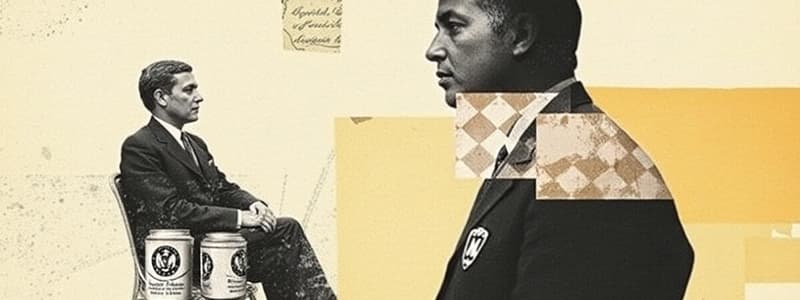Podcast
Questions and Answers
What is one major downside of interviews in employee selection?
What is one major downside of interviews in employee selection?
- Interviews are less informative than resumes.
- Interviews can be subjective and influenced by biases. (correct)
- Interviewers' time is not considered a factor in the cost.
- Interviews are always conducted by trained professionals.
Which bias involves interpreting information in a way that supports one's existing beliefs?
Which bias involves interpreting information in a way that supports one's existing beliefs?
- Framing Effect
- Confirmation Bias (correct)
- Stereotyping
- Anchoring Bias
How can interviewer biases be effectively reduced?
How can interviewer biases be effectively reduced?
- Through comprehensive interviewer training. (correct)
- By using more resumes instead of interviews.
- By limiting the time allocated for interviews.
- By ensuring each interview is unstructured.
What is the consequence of Anchoring Bias in decision-making?
What is the consequence of Anchoring Bias in decision-making?
Which type of bias involves forming judgments about individuals based on their group characteristics?
Which type of bias involves forming judgments about individuals based on their group characteristics?
What describes the purpose of interviewer training in the hiring process?
What describes the purpose of interviewer training in the hiring process?
During an interview, what does Anchoring Bias often cause interviewers to do?
During an interview, what does Anchoring Bias often cause interviewers to do?
Which of the following best describes an interview's cost implications?
Which of the following best describes an interview's cost implications?
What is the halo effect in the context of interviews?
What is the halo effect in the context of interviews?
Which of the following describes leading questions in an interview?
Which of the following describes leading questions in an interview?
What effect does interviewer domination have in an interview setting?
What effect does interviewer domination have in an interview setting?
How does similar-to-me bias affect an interviewer's judgment?
How does similar-to-me bias affect an interviewer's judgment?
What is the primary purpose of situational questions during an interview?
What is the primary purpose of situational questions during an interview?
What is the focus of behavioral questions in an interview?
What is the focus of behavioral questions in an interview?
Which of the following is NOT a characteristic of leading questions?
Which of the following is NOT a characteristic of leading questions?
What is implied by the pitchfork effect during interviews?
What is implied by the pitchfork effect during interviews?
Flashcards
Interview Bias
Interview Bias
A flaw in the interview process where personal opinions and prejudices affect the interviewer's judgment, leading to unfair evaluations.
Confirmation Bias
Confirmation Bias
The tendency to favor information that confirms pre-existing beliefs and ignore contrary evidence.
Interviewer Training
Interviewer Training
A process of educating interviewers on techniques to minimize bias and ensure fair evaluations during the interview.
Anchoring Bias
Anchoring Bias
Signup and view all the flashcards
Stereotyping
Stereotyping
Signup and view all the flashcards
Halo Effect
Halo Effect
Signup and view all the flashcards
Leading Questions
Leading Questions
Signup and view all the flashcards
Interviewer Domination
Interviewer Domination
Signup and view all the flashcards
Similar-to-Me Bias
Similar-to-Me Bias
Signup and view all the flashcards
Situational Questions
Situational Questions
Signup and view all the flashcards
Behavioral Questions
Behavioral Questions
Signup and view all the flashcards
Pitchfork Effect
Pitchfork Effect
Signup and view all the flashcards
Interview Cost
Interview Cost
Signup and view all the flashcards
Study Notes
Interview Bias
- Interviewing is an expensive part of the selection process (interviewer's time).
- Interviews are subjective and prone to bias.
- Interviewer training is a way to reduce biases.
- Confirmation Bias: Tendency to favor information that confirms existing beliefs.
- Anchoring Bias: Over-reliance on initial information when making decisions (the "anchor").
- Stereotyping: Forming opinions based on race, gender, religion, or other characteristics.
- Halo Effect: Positive characteristics overshadowing the entire interview.
- Pitchfork Effect: Negative characteristics overshadowing the entire interview.
- Leading Questions: Framing questions to elicit desired answers.
- Interviewer Domination: Interviewer talking more than the applicant.
- Similar-to-me Bias: Favorability towards candidates with similar backgrounds.
Types of Structured Questions
- Situational Questions: Job-specific questions that test cognitive ability in real-world scenarios.
- Behavioral Questions: Evaluating past performance to predict future performance.
- Personality-Based Questions: Assessing personality traits relevant to the job.
Studying That Suits You
Use AI to generate personalized quizzes and flashcards to suit your learning preferences.




